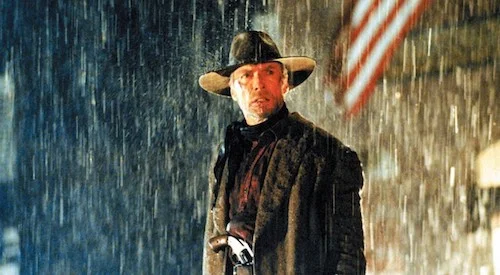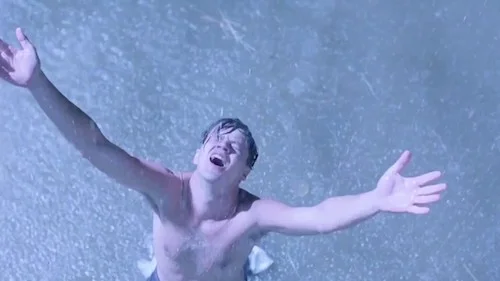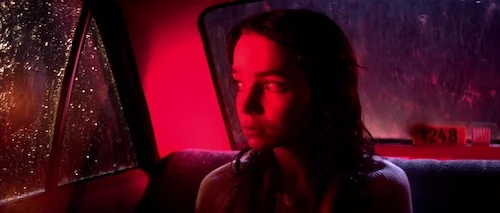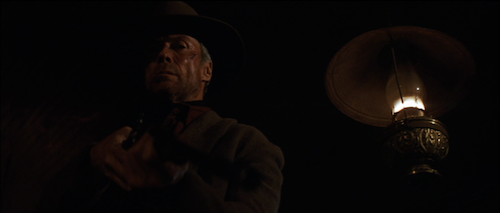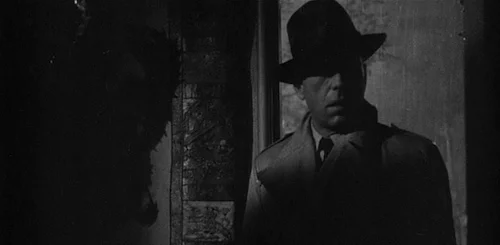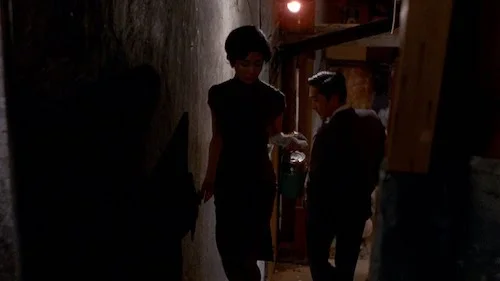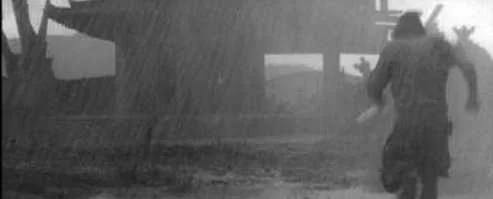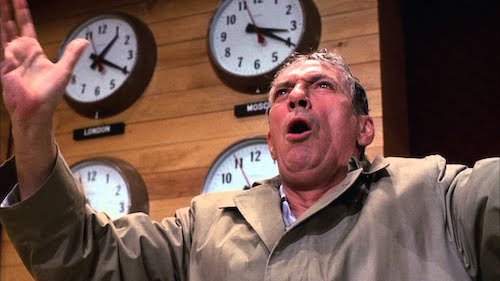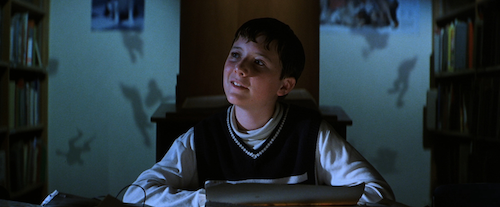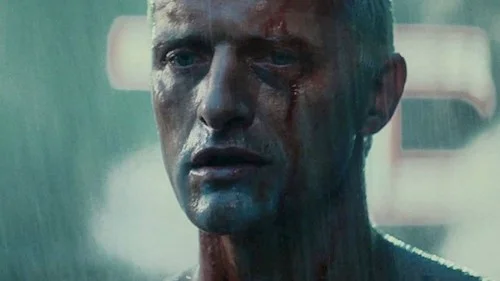Ten Film Scenes That Embrace Rain Unlike Any Other
April showers bring May flowers. That's how the expression goes, right? We are meant to feel better about the crummy weather because of what is meant to come afterwards. Toronto has been bogged down by downpours day in and day out. It's better than snow, but precipitation of any sort is starting to become cumbersome. Is there any way to enjoy rain in the moment? In film, there sure is! Rain is usually used as a pathetic fallacy to dictate a mood. What are the best examples of this kind of scene? What are deviations of this cliché? Well, since there is nothing better to talk about (and this awful weather isn't going anywhere), it is time to celebrate rain, with ten of the best film moments that deal with the countless droplets in the greatest ways.
Be cautious: every single entry will contain spoilers.
10. The Shawshank Redemption
Andy Dufresne finally finds his way out of the titular prison after sifting through the worst of natural materials: a symbol of his life, no less. We all know the moment. He finally breaks out, and finds himself welcoming the storm that is drenching him. This is a nice contrast of rain typically representing misery (this is a triumphant event), and it is the cleansing of a tortured soul finally breaking out of confinement.
9. Suspiria
Suzy enters a new country (Germany) and she is greeted with a storm. Nothing wrong is happening for her, but this weather is a definite harbinger of things to come. At that moment, it is a connecting experience: a dancer (Patricia) from the Tanz Dance Academy is running away from said institution. She ends up being brutally murdered in one of the most inventive scenes in any horror film (and in completely abstract, gory fashion). Suzy is heading towards this curse. The rain is only the beginning.
8. Unforgiven
Much of this neo western is a return to the old style. The sun is blaring, and the sand is hot. Weren't we supposed to be dismantling the good old days of the western genre? Isn't that something Clint Eastwood was trying to bid farewell? You would be right. The rain pounds at the end of the film, in the darkest depths of night (and hell). Will Munny transforms from the saviour of the film into the angel of death: an indisputable villain we rooted for this whole time. A crowded bar becomes silenced, and all you can hear is the army of droplets outside hushing the silence of demise.
7. The Big Sleep
Films noir and rain go hand-in-hand. Most of these films would probably be better suited on a “full-on-rainy-film” list. We have to include at least one key example, right? What about when Philip Marlowe visits the bookstore in The Big Sleep, and stumbles into a representative (played by Dorothy Malone)? It’s short, but it describes the film noir way so greatly. Marlowe waits the storm out, and bribes the “Acme Bookstore” lady with some booze: “I’d rather get wet in here”. Being drenched in rain due to woes, or drowning ones sorrows due to woes; can it get any more noir than this?
6. In the Mood for Love
Much of this modern classic basks in the permanence of a moment. What is going on when eyes lock? When hearts melt? When sorrows dissolve? What happens when the complete opposite happens, too? When guilt suffocates? When longing stings? When love kills? One of the many breathtaking moments is Chow and Sue embracing the inevitable during a downpour (much like the rain that surprised Chow earlier in the film). This was the outcome they knew was going to happen. They try to prepare for the worst, but even that hurts too much. The sound of rain disappears, and Su’s sobs overtake the moment, much like a dizzying, traumatic memory.
5. Rashomon
Rain is heavily used in this film, but only during the present. The rain won’t disappear, because the drastically conflicting viewpoints of a crime do not add up. Progress to get out of the storm is not made. Conflicts are even held in the rain later on in the film. The tiny shelter being used? That’s the comfort of dishonesty The truth always comes through, and it shows when the rain no longer is a part of the backdrop. Akira Kurosawa was obsessed with using rain in many of his films, but Rashomon may have utilized it the best.
4. Network
Being mad as hell is all fine and dandy. Not taking it anymore? That’s the step forwards. Howard Beale is a delirious news anchor-turned-televised prophet that finds it absolutely necessary to return back to work during some heavy showers. Drenched, and miserable, Beale works his way to the cameras to deliver his spiel. He shouts the classic line, and suddenly viewers all across America are dipping their heads out of their windows, being blasted by rain, and screaming that they, too, are fed up. It’s a union: facing the misery together.
3. Magnolia
Weather forecasts are planted throughout various parts of Magnolia, and the characters experience the meteorological patterns in varying ways. Not a cloud in the sky turns into torrential nightmare. The sky clears up only for the great cinematic shock of the '90s: frogs raining from the sky. It is the moment of chance that sets off countless scenarios of serendipity. Some people bond over this moment. A few just slip from the hands of death. None of these characters know how to deal with it (outside of wonder kid Stanley, who acknowledges it for what it is: fate). It is the wrench in the machine that absolutely no one sees coming, and no one ever forgets.
2. Singin' in the Rain
The title of this iconic musical is only based on one song, but it's one that counts. The decision for silent film stars to find new life in talking pictures is accepted, and the struggle is about to end. Don Lockwood departs this revelatory meeting at the midnight hour, and it is pouring outside. No matter how dark or wet it is, this I'd about taking on discomfort head on. The umbrella gets tossed, and a dance number for the ages commences. Splashes replace tap shoe claps, and pattering raindrops replace applause. What a wonderful feeling, indeed.
1. Blade Runner
You won't find a better use of rain than the ending to this dystopia neo-noir. A deadly fight between Deckard and the replicant Roy Batty finds it way onto a building rooftop. Batty begins to turn coat, and embrace the storm (his timely demise). With the famously improvised line "Memories are lost like tears in rain", (a nice touch from actor Rutger Hauer), the acknowledgment that time is never kind begins to sting. This emotional end is the most humanistic scene in the film, partially because we are no longer being drenched by the rain on the filthy streets of new Los Angeles, but we are connecting with it from its high up source. Toss in Vangelis’ hypnotic score, and you’re witnessing one of the most spellbinding moments in sci-fi history (as well as arguably the best rain scene of all time).
Andreas Babiolakis has a Masters degree in Film and Photography Preservation and Collections management from Ryerson University, as well as a Bachelors degree in Cinema Studies from York University. His favourite times of year are the Criterion Collection flash sales and the annual Toronto International Film Festival.

